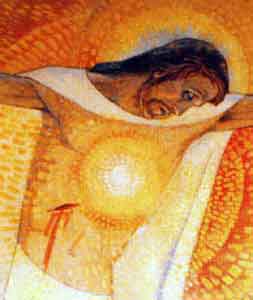The emphasis on Luke in Year C is set aside this week as the beginning of Jesus’ public life is considered from a highly symbolic perspective, the one offered by John in his story of the Wedding Feast of Cana. As we see in the first reading today, weddings are symbolic of the relationship between God and Israel. However,  the marriage between God and his people is in trouble and this is indicated by the phrase of Jesus’ mother when she says ‘they have no wine’. Wine is the sign of joy and celebration arid this is what is missing, and all the gallons of water for rites of purification cannot put it right. But this is precisely why Jesus has come – to make the marriage happen, to bring us to union with God. What happens at Cana is a sign that points to the whole meaning of Jesus’ life, death and resurrection, a meaning that can only be fully understood after his ‘hour‘. As the disciples contemplate the marvellous outpouring (literally!) of God’s love, symbolised by the best wine, they come to believe in him – this is what is asked of us too.
the marriage between God and his people is in trouble and this is indicated by the phrase of Jesus’ mother when she says ‘they have no wine’. Wine is the sign of joy and celebration arid this is what is missing, and all the gallons of water for rites of purification cannot put it right. But this is precisely why Jesus has come – to make the marriage happen, to bring us to union with God. What happens at Cana is a sign that points to the whole meaning of Jesus’ life, death and resurrection, a meaning that can only be fully understood after his ‘hour‘. As the disciples contemplate the marvellous outpouring (literally!) of God’s love, symbolised by the best wine, they come to believe in him – this is what is asked of us too.
Reflection
 It is somewhat ironic that we find ourselves now in Ordinary Time for there is nothing ‘ordinary‘ in what is being said of us in today’s readings. On the one hand, the prophet is asking his people to recognise God’s personal and passionate love for them while, on the other, Paul is celebrating the abundance of gifts which this loving God has bestowed on his people. All of this is symbolised in the story of Cana where the wine of God’s joy flows liberally among the guests. The readings all point to the extraordinary dignity which is given to each one of us as a child of God. If only we could truly believe it of ourselves then we might more readily respect it in others.
It is somewhat ironic that we find ourselves now in Ordinary Time for there is nothing ‘ordinary‘ in what is being said of us in today’s readings. On the one hand, the prophet is asking his people to recognise God’s personal and passionate love for them while, on the other, Paul is celebrating the abundance of gifts which this loving God has bestowed on his people. All of this is symbolised in the story of Cana where the wine of God’s joy flows liberally among the guests. The readings all point to the extraordinary dignity which is given to each one of us as a child of God. If only we could truly believe it of ourselves then we might more readily respect it in others.
Gospel Reflections courtesy of catholicireland.net
